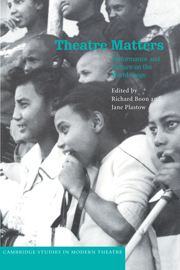Book contents
- Frontmatter
- Contents
- Notes on contributors
- Foreword: A letter from Kingston
- Preface
- Acknowledgements
- 1 Introduction
- 2 ‘The Revolution as Muse’: drama as surreptitious insurrection in a post-colonial, military state
- 3 Making theatre for a change: two plays of the Eritrean liberation struggle
- 4 Race matters in South African theatre
- 5 Dreams of violence: moving beyond colonialism in Canadian and Caribbean drama
- 6 The French-speaking Caribbean: journeying from the native land
- 7 ‘Binglishing’ the stage: a generation of Asian theatre in England
- 8 Popular theatre for the building of social awareness: the Indian experience
- 9 The promise of performance: True Love/Real Love
- 10 Making America or making revolution: the theatre of Ricardo Halac in Argentina
- Index
2 - ‘The Revolution as Muse’: drama as surreptitious insurrection in a post-colonial, military state
Published online by Cambridge University Press: 25 October 2009
- Frontmatter
- Contents
- Notes on contributors
- Foreword: A letter from Kingston
- Preface
- Acknowledgements
- 1 Introduction
- 2 ‘The Revolution as Muse’: drama as surreptitious insurrection in a post-colonial, military state
- 3 Making theatre for a change: two plays of the Eritrean liberation struggle
- 4 Race matters in South African theatre
- 5 Dreams of violence: moving beyond colonialism in Canadian and Caribbean drama
- 6 The French-speaking Caribbean: journeying from the native land
- 7 ‘Binglishing’ the stage: a generation of Asian theatre in England
- 8 Popular theatre for the building of social awareness: the Indian experience
- 9 The promise of performance: True Love/Real Love
- 10 Making America or making revolution: the theatre of Ricardo Halac in Argentina
- Index
Summary
… the only safe place I've ever known is at the centre of a story, as its teller.
(Athol Fugard)We might say then … that Osofisan's play is, ultimately, a celebration of the Revolution as Muse.
(Abiola Irele)Except by surreptitious tactics, the voice of protest in a one-party state cannot be pressed to the public ear. When the state in question is, in addition, under the iron grip of military dictatorship, and one too that is stridently intolerant of criticism and opposition, protest in whatever form becomes a gamble with danger, unless formulated with especial cunning. In particular, in the field of drama, a recourse to ruse becomes de rigueur, if only because, in theatrical performance, the fate of several persons is involved; hence the artist must accept it as a primary obligation to proceed through such strategies of enlightened guile that will ensure that his or her collaborators do not become the careless victims of official thugs. Happily, however, against the inert silence which autocrats seek to impose upon their subjects, the dissenting artist can triumph through the gift of metaphor and magic, parody and parable, masking and mimicry. With this gift, properly deployed, the terror of the state can be confronted, demystified. But it has to be a conscious tactic of deployment, one that has also to be constantly re-tuned and re-honed to the particular moment, a covert and metamorphic system of manoeuvring which, for want of a better term, I have summarised as ‘surreptitious insurrection’.
- Type
- Chapter
- Information
- Theatre MattersPerformance and Culture on the World Stage, pp. 11 - 35Publisher: Cambridge University PressPrint publication year: 1998
- 7
- Cited by



